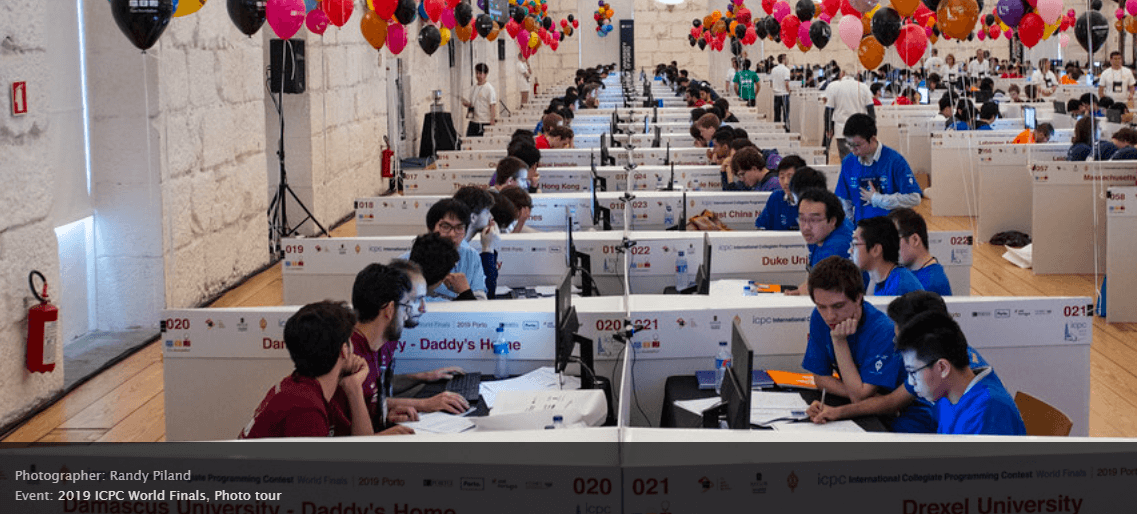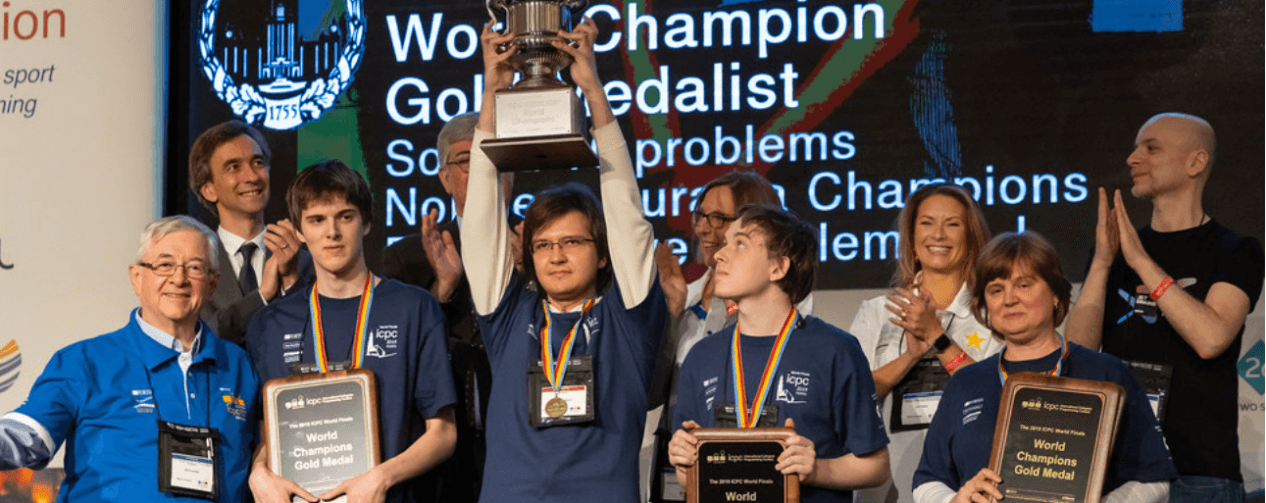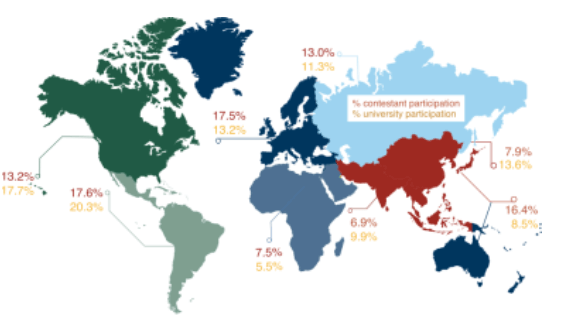What is ACM ICPC?
The ICPC formerly called ACM-ICPC (Association for Computing Machinery - International Collegiate Programming) is a contest that can be considered as the championship or Olympic for programming competitions held across the globe. It is the largest event for programming in the world which prestigious and oldest heritage of generic best problem solvers in the world of programming. 
It is generally a team-based coding competition that follows a multi-tier approach kind competition. The number of participants it has is more than the best developers in the popular and large firms and reasons huge firms in the list of FAAANG (Facebook Amazon Apple Netflix and Google) directly get to hire the best of the best problem solvers in the world. This programming competition is spread across 2000 universities in the world where the participants from 80 countries compete against each other and thrive to be the best. Why participate?Emphasizing the prize money, the top team strives to take away approximately $15,000 along with exclusive Gold Medals in association with ACM ICPC. There's a price distribution pattern for certain categories like Gold where the price money ranges in the decreasing order of the sequence. There other teams apart from the Gold Medal winners get $7500. For the Silver Medal winners, each participant gets $6000 each followed by the Bronze Medal team which gets $3000. All the participants are it Gold, Silver or Bronze get an honor badge with courtesy of the UPE Computer Science Honor Society. Apart from this, those solve some specific problem they are awarded the First Solution Award and the prize money of $1500 and for those with First to solve get $1200. 
There's also another catch. Participants not only take home the prize money, but they also carry away recognition. They get superb bragging rights and job offers from top-notch companies in the world. Structure of the contestThe ACM ICPC contest is structured into two rounds. They are: ICPC RegionalAs the name suggests, ICPC Regional is solely organized by some of the local universities spread across different regions in the words. Since it is regional, the winner of the region represents their country in the World Finals of ICPC. Talking about the Asian Regions in India, there are 4 sites where ICPC is held namely Amritapuri, Gwalior, Kharagpur, and Kolkata. In every regional site, there's a slot that ensures the invitation for the team to move on to the World Finals. These slots are allocated before the main event precisely on 31st December every year. Some bonus slots are later allocated to the students based on the availability on the institution level, geographic coverage, or a team's exceptional performance. Therefore, depending on the region's top teams is taken into consideration and are sent to the World Finals. These bonus slots are also meant for individual growth and prosperity, innovation, and talent hosting. World FinalsAfter the regional selections are done based on various parameter clearances by different teams, the best teams selected are amongst applicants. Then, they are pushed into an online contest where the participants are made to compete with each other and the winners are taken into World Finals. It is usually held in October and December and the regional finalists are picked up from every region site to knock down others at the World Finals. Participation EligibilityTo conquer ICPC, the basic eligibility criteria a participant needs to have consisted of the following points:
Format of ACM ICPCThe format is followed as follows:
ICPC CommunityACM ICPC has a very special community of problem solvers who are considered the best problem solvers in the world. The community is powered through plenty of volunteers who outshine to provide several opportunities to show their problem-solving skills. In the world of computing, university faculties, high-tech industrial partners, program administrators, and community leaders create a backbone for each and everyone associated with ICPC. Each participant is taken special care and in case of any clarification, they have huge communities of experienced developers and avid problem solvers who are very helpful. 
Talking about the regional contest, the regional contests are held by individual institutions who fall under the Asian sites like that of Amritapuri, Gwalior, Kharagpur and Kolkata have special mentors assigned and they readily represent regions and countries when it comes to World Finals. Also, there are huge numbers of volunteers who are the heart of ICPC and an essential part of everything ICPC does. How to prepare?Preparation of ACM ICPC is not just confined to learning the basics of programming. Ever since the onset of ICPC in the vision of competitive programmers, the level of difficulty is being increased because these days' problem solvers have a high pace if compared to the participants in the previous seasons of ICPC. Due to the complexity of the competition, the level is kept as optimized as possible with problem statements ranging from tough to best-optimized solutions. To get prepared for the ACM ICPC, there's a huge practice recommended along with practicing in such a way that you generate the most optimized time complexity. Regardless of the space complexity being ignored in generic programming these days, ICPC lays its foundation on the hardcore algorithmic approach of proceeding with a problem. To be at that particular level, you need to work on Data Structures and Algorithms. A sample problem at ICPC possesses the following features that would frame you with the exact approach on how to proceed. Problem statement: It explains the problem along with the generated output. Input: Ensure you read this section with utmost care as anything missing would land you in trouble. Output: Same as input but the processed result and should be carefully read. Memory limit: Try to keep your solution under the range of space provided in the problem statement, although not necessary it must be near to it. Time limit: Ensure the complexity of the algorithm you applied matches the desired time limit. If not, try to optimize it as far as possible else it would though TLE (Time Limit Exceeded) Constraints: It is the rule your code needs to follow while implementing it. Preparation platforms
Most important topics to prepare
Note: You need to have command over all of the above-mentioned topics along with practice on the same topic with different examples. Try to generate the output in best case complexity so that the time limit doesn't exceed. Remember ICPC judges these aspects with great depths hence it is always recommended to try an optimized approach by seeing other person's solution.SummaryACM ICPC is a prestigious event to take part in. It is not just confined to problem-solving as discussed earlier. It is more often driven by the objective of helping others to stand out from a crowd by pushing their limits. ICPC is a highly sponsored event including tech giants who hire the best talents from this event making it a great talent-hiring pool. As discussed, one needs to have good command over basic programming skills and to move from the regional to finals one needs to have exceptional coding skills with a massive grip on data structures and algorithms. Following a steep learning curve for ICPC preparation and not winning may disturb the team but in turn, it carves their niche and makes them fit for all the software developer roles available in the market. The preparation strategy itself can make you stand apart and you might even land your dream job from this.
Next TopicHow to Send Fax from Gmail
|
 For Videos Join Our Youtube Channel: Join Now
For Videos Join Our Youtube Channel: Join Now
Feedback
- Send your Feedback to [email protected]
Help Others, Please Share










